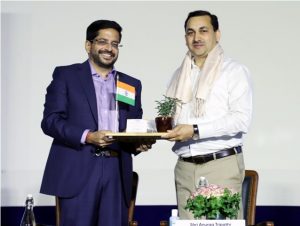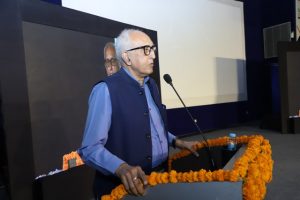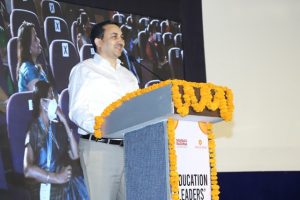Faridabad NCR
Padma ShriDr. V S Chauhan, Executive Chairman, NAAC and ShriAnurag Tripathi, Secretary, CBSE graced the occasion as Keynote Speakers

Faridabad Hindustan ab tak/Dinesh Bhardwaj : 20 March Leading academicians and educationists deliberatedupon ‘The New-Age Global Skill Conundrum: Unlocking the next paradigm’during the Education Leaders’ Summit 2021 organised jointly by Manav Rachna Educational Institutions at ASSOCHAM India at the MREI campus today.
The Summit brought together Principals from schools of Delhi NCR, policy makers, and institution heads to discuss strategies and best practices with an aim ofcatalysing India’s transformation into one of the top 10 innovation-led countries of the world.
In his keynote address, ShriAnuragTripathi, Secretary, CBSEsaid that “NEP 2020 talks about the holistic development of the students where they are not just focused on getting jobs but also on developing a society where there is compassion and Indian ethos. We are ensuring education and knowledge-based learning but where is the application of the skills and competency. India needs that long jump where we need to skill our young generation for employability.The dynamics have to be shifted towards skill education, teaching pedagogy, teacher training, and towards analysing learning outcome through assessment”.
Dr. Prashant Bhalla, Chairman, ASSOCHAM National Council on Education and President, Manav Rachna Educational Institutions; in his welcome speech said that, “Manav Rachna’s vision has always been imparting education and develop a generation of students for the greater good and that is what we have been focusing on for such a long time now. The ideas of sustainable development, holistic development and social growth has always been a part of Manav Rachna DNA and now we need to ensure the implementation of some major challenges that are competence-based teaching, teacher upgradation, modern pedagogy and the assessment. The emphasis on teachers is most crucial as the 21st century skill integration, is must for those who are the front runners, our teachers.”
Dr. I K Bhat, Vice Chancellor, Manav Rachna University welcomed the guests and stated that now the entire world is talking about the ‘Virtual University’ and now the focus has shifted from just basic skills to a holistic development where social initiatives and skills are becoming equally important but that puts a lot of pressure on the teachers of this era.
Dr. Sanjay Srivastava, Vice Chancellor, Manav Rachna International Institute of Research and Studies, welcomed Padma Shri Dr. V S Chauhan, Executive Chairman, NAAC and highlighted how education is the pillar of development and now we all should collectively own the responsibility to bring a change we wish for there to be in the world.
Padma Shri Dr. V S Chauhan shared his valuable insights and said: “We have achieved commendable milestones in education and beyond, also there is no denying the fact that India has come a long way. But yes, we need to take ownership for all that, which we believe is not going in the desirable direction.”
The summit comprised two pertinent panel discussions. The first panel had Col K Pratap Singh, Chairman, Colonel’s Central Academy; Ms.Manju Gupta, Principal, Kothari International School Noida; Ms.PriyankaBarara, Principal,- MRG School Delhi; Ms.SurjeetKhanna, Principal, DPS Greater Faridabad; and Ms.Sanyogita Sharma, Director, Manav Rachna International Schools. They deliberated on how modern education is based on learning and evolving at every stage as per the changing trends and requirement of the modern era.
The second panel comprisedDr. Ashwin Fernandes, Regional Director – Quacquarelli Symonds Middle East, South Asia & North Africa; Mr. Narayanan Ramaswamy, Partner & Head, Education and Skill Development Practice – KPMG, India; Mr. VenkateshSarvasiddhi, Senior Head – Digital Skills, Innovation, Partnership & CSR – NSDC; Mr. AmarendraPani, Joint Director – Research, Association of Indian Universities; Col Girish K Sharma, Director – Planning & Coordination MREI who discussed‘International Collaborations for building future-ready youth: A global perspective’.
Mr. Narayanan Ramaswamyshared that as per reports by 2030, one-third of the world’s working age population will be from India, so the need to look into our own education and employability is of prime importance.
Dr. Ashwin Fernandes, agreed with the viewpoints of the Mr. Ramaswamy and added that he would like to highlight the three global characteristics of the youth today, “Young learners will continuously reinvent learning, aspire towards establishing a new global citizenship, and they are futuristic learners”. He further said that there has to be the focus on how jobs are changing and how evolved skill sets are required for the changing world we are the part of.
Mr. VenkateshSarvasiddhi stressed upon the digital skills that needs to be an integral part of education now. Mr.AmarendraPani said that we need to upgrade the curriculum considering the international orientation, and also when it comes to teaching collaboration, there is a lot that needs to be done and promoted. Student exchange, faculty exchange and several other such programs needs to be adopted for the modern pedagogy and educational revolution we wish to bring in our nation.
We are confident that the content, learning, experience, exposure and thinking promised at the Summit would prove critical to the teachers and the students while shaping a better future for the new normal.
